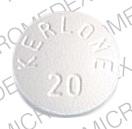Kerlone
Generic name: betaxolol [ bay-TAX-oh-lol ]
Drug class: Cardioselective beta blockers
The Kerlone brand name has been discontinued in the U.S. If generic versions of this product have been approved by the FDA, there may be generic equivalents available.
What is Kerlone?
Kerlone is a beta-blocker. Beta-blockers affect the heart and circulation (blood flow through arteries and veins).
Kerlone is used to treat hypertension (high blood pressure).
Kerlone may also be used for purposes not listed in this medication guide.
Kerlone side effects
Get emergency medical help if you have signs of an allergic reaction: hives; difficult breathing; swelling of your face, lips, tongue, or throat.
Kerlone may cause serious side effects. Call your doctor at once if you have:
-
shortness of breath (even with mild exertion), swelling, rapid weight gain;
-
slow or uneven heartbeats;
-
a light-headed feeling, like you might pass out; or
-
lupus-like syndrome--joint pain or swelling with fever, swollen glands, muscle aches, chest pain, vomiting, unusual thoughts or behavior, and patchy skin color.
Slow heartbeats may be more likely in older adults.
Common side effects of Kerlone may include:
-
slow heartbeats;
-
headache, dizziness;
-
feeling weak or tired;
-
upset stomach; or
-
decreased sex drive, impotence, or difficulty having an orgasm.
This is not a complete list of side effects and others may occur. Call your doctor for medical advice about side effects. You may report side effects to FDA at 1-800-FDA-1088.
Related/similar drugs
Warnings
You should not use Kerlone if you have a serious heart condition such as "AV block" (2nd or 3rd degree), uncontrolled heart failure, slow heartbeats that have caused you to faint, or if your heart cannot pump blood properly.
Before taking this medicine
You should not use Kerlone if you are allergic to it, or if you have a serious heart condition, such as:
-
"AV block" (2nd or 3rd degree);
-
uncontrolled heart failure;
-
slow heartbeats that have caused you to faint; or
-
if your heart cannot pump blood properly.
To make sure Kerlone is safe for you, tell your doctor if you have ever had:
-
asthma, bronchitis, emphysema;
-
angina (chest pain), congestive heart failure, coronary artery disease;
-
diabetes;
-
a thyroid disorder;
-
psoriasis; or
-
liver or kidney disease.
Using Kerlone during pregnancy could harm the unborn baby, or cause heart or lung problems in the newborn baby. Tell your doctor if you are pregnant or if you become pregnant while using Kerlone.
Betaxolol can pass into breast milk and may cause side effects in the nursing baby. Tell your doctor if you are breast-feeding.
Kerlone is not approved for use by anyone younger than 18 years old.
How should I take Kerlone?
Follow all directions on your prescription label. Your doctor may occasionally change your dose. Do not use this medicine in larger or smaller amounts or for longer than recommended.
It may take up to 2 weeks before your blood pressure improves.
Keep using this medicine as directed, even if you feel well. High blood pressure often has no symptoms. You may need to use blood pressure medicine for the rest of your life.
Kerlone may be only part of a complete treatment program that may also include diet, exercise, weight control, and taking other medications. Follow your doctor's instructions very closely.
This medicine can cause unusual results with certain medical tests. Tell any doctor, dentist, or eye doctor who treats you that you are using Kerlone.
You should not stop using Kerlone suddenly. Follow your doctor's instructions about tapering your dose and limiting physical activity for a short time.
Store at room temperature away from moisture and heat.
Keep the bottle tightly closed when not in use.
What happens if I miss a dose?
Take the missed dose as soon as you remember. Skip the missed dose if it is almost time for your next scheduled dose. Do not take extra medicine to make up the missed dose.
What happens if I overdose?
Seek emergency medical attention or call the Poison Help line at 1-800-222-1222.
Overdose can cause slow heartbeats, shortness of breath, dizziness, fainting, or low blood sugar (headache, hunger, irritability, feeling anxious or shaky).
What should I avoid while taking Kerlone?
Kerlone may impair your thinking or reactions. Avoid driving or operating machinery until you know how this medicine will affect you.
Drinking alcohol with Kerlone can cause side effects.
What other drugs will affect Kerlone?
Tell your doctor about all your current medicines and any you start or stop using, especially:
-
digoxin, digitalis;
-
a diuretic or "water pill";
-
other beta-blockers, including medicine for asthma or other breathing disorders, or eye drops used to treat glaucoma; or
-
any other heart or blood pressure medications.
This list is not complete. Other drugs may interact with betaxolol, including prescription and over-the-counter medicines, vitamins, and herbal products. Not all possible interactions are listed in this medication guide.
More about Kerlone (betaxolol)
- Check interactions
- Compare alternatives
- Drug images
- Side effects
- Dosage information
- During pregnancy
- Drug class: cardioselective beta blockers
- Breastfeeding
Patient resources
Professional resources
Related treatment guides
Further information
Remember, keep this and all other medicines out of the reach of children, never share your medicines with others, and use this medication only for the indication prescribed.
Always consult your healthcare provider to ensure the information displayed on this page applies to your personal circumstances.
Copyright 1996-2025 Cerner Multum, Inc. Version: 11.01.

